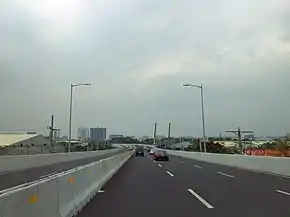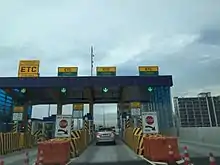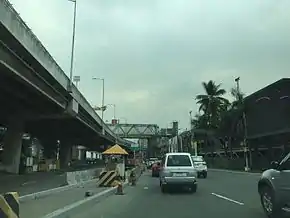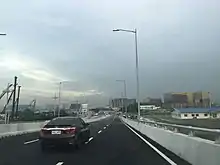.svg.png.webp)  | ||||
|---|---|---|---|---|
.png.webp) A map of expressways in Metro Manila, with the NAIA Expressway in orange | ||||
 NAIA Expressway, looking south towards NAIA Road from Andrews Avenue in Pasay | ||||
| Route information | ||||
| Maintained by Skyway Operations & Maintenance Corporation (SOMCo) | ||||
| Length | 11.6 km (7.2 mi) | |||
| Existed | 2016–present | |||
| Restrictions | No motorcycles below 400cc, passenger jeepneys, and closed light trucks | |||
| Major junctions | ||||
| West end | Entertainment City in Parañaque[1] | |||
| East end | ||||
| Location | ||||
| Country | Philippines | |||
| Major cities | Parañaque, Pasay, Taguig | |||
| Highway system | ||||
| ||||
| ||||
The Ninoy Aquino International Airport Expressway (NAIAX),[3] signed as E6 of the Philippine expressway network, is an 11.6-kilometer (7.2 mi) elevated highway in Metro Manila, Philippines, which links the Skyway to Ninoy Aquino International Airport and Entertainment City. Traversing the cities of Taguig, Pasay, and Parañaque, the NAIAX runs along Andrews Avenue, Electrical Road, and NAIA Road connecting the Skyway to Ninoy Aquino Avenue, Macapagal Boulevard, New Seaside Drive and the Manila–Cavite Expressway.[1]
The expressway is the first airport expressway in the Philippines. It opened in September 2016.[4] It traverses the cities of Pasay and Parañaque.
Route description

From the Sales Interchange (NAIA Exit) of Skyway, the expressway heads to the southwest and runs along Sales Road across Villamor Airbase and Newport City. It then curves to the northwest on Andrews Avenue towards the entrance to NAIA Terminal 3 and continues along the northern perimeter of the airport towards Electrical Road near NAIA Terminal 4. From here, it makes a turn to the south and runs along Parañaque River, parallel to Domestic Road on the east towards the NAIA Road junction. From this junction, the expressway branches into two, with one traversing eastwards to NAIA Terminals 1 and 2, while the other continues westwards to Entertainment City and the Manila–Cavite Expressway.
Features
The expressway is operated and maintained by Skyway Operations & Maintenance Corporation (SOMCo), the same company that operates Skyway, while its concession holder is SMC NAIAX Corporation (formerly Vertex Tollways Development, Inc.); both companies are subsidiaries of San Miguel Corporation.[5][6]
Lanes
.jpg.webp)
Prior to the opening of the Skyway expansion project (by eliminating shoulders and shrinking the median) in 2020 that resulted in a grand total of 7 lanes,[7] and due to the lack of right of way available for the project, NAIAX is the second expressway that does not have a shoulder, after North Luzon Expressway between Balintawak to Balagtas (Tabang Interchange) following widening to four lanes as a heavily traveled segment,[8] and the first expressway having a narrow concrete barrier as median. Even though SMC claims that NAIAX is a 4-lane elevated expressway,[9] in fact, SMC via its subsidiary, Vertex Tollways Development, has built 5 to 7 lanes on the expressway without shoulders and with a narrow median barrier, with the configurations listed below.
5-lane zones
- 2 lanes to Macapagal Boulevard/NAIA Interchange (catering to motorist to/from NAIA Terminal 1 and 2) and 3 lanes to Skyway for (1) half part of the expressway's Parañaque River alignment and (2) the alignment from NAIA Terminal 3 exit (+/- 500 m (1,600 ft) before the exit) to Andrew Ave off-ramp; the first part is configurated to tackle the possible traffic jam by the merging of NAIAX from the airport and Macapagal Boulevard
- 3 lanes to NAIA Interchange and 2 lanes to Skyway for another half part of the river alignment and above Airport Road to NAIA Terminal 3 Exit
- 2 lanes to NAIA Interchange and 3 lanes to Macapagal Boulevard west of NAIA Interchange
7-lane zones
These zones are actually 5 lanes with an acceleration lane for each direction to cater vehicles transferring between interchanges that are so close to each other.
- from NAIA interchange to NAIAX-CAVITEX Interchange, where 4 lanes go westbound and 3 lanes go eastbound (to NAIA)
- from Skyway to Andrews Avenue off-ramp, where 4 lanes go westbound (to NAIA) and 3 lanes go eastbound
Speed limit
The maximum speed on all segments of the expressway is 60 kilometers per hour (37 mph).[10] The expressway has an overhead speed gantry so drivers can see the speed they cruise on; the gantry itself is located near the eastbound off-ramp to NAIA 3.
History
.jpg.webp)
On July 17, 2001, President Gloria Macapagal Arroyo and her Cabinet approved the construction of the NAIA Expressway, which would be funded through a Japanese loan package,[11] and construction of its interchange with Skyway began on March 17, 2004.[12] Construction of the 1.6-kilometer (0.99 mi) NAIA Expressway Phase 1 (NAIA Terminal 3 Exit of Skyway) was completed and inaugurated on May 30, 2009.[13][14] It provided an entry/exit ramp to the then newly-opened NAIA Terminal 3 and Resorts World Manila.
Phase 2 of the NAIA Expressway project was approved by the Benigno Aquino III Administration on May 30, 2012.[15] It included a 4.83-kilometer (3.00 mi) extension of the expressway all the way to Macapagal Boulevard in Entertainment City, Parañaque via Andrews Avenue, Electrical Road (west of Domestic Road) and NAIA Road.[15] The project was funded through a public-private partnership (PPP) scheme, with San Miguel Corporation winning the bidding for its construction, operation and maintenance.[16] On January 2, 2014, construction began on Phase 2 of the NAIA Expressway.[17][18] On September 22, 2016 at exactly 12:01 AM (PHT), the second phase of the airport expressway from Macapagal Boulevard to NAIA Terminals 1 and 2 was opened to all motorists and airport passengers rushing to their flights in order to avoid the traffic lights at every intersection along NAIA Road. Toll collection at the NAIAX begun on October 22, exactly one month after the opening of the airport tollway.[1][4]
On November 28, 2016, the on-ramp of the expressway's western terminus was removed as the new on-ramp in the expressway opened on November 4.[19]
On December 21, 2016 at exactly 6:00 AM (PHT), the Entertainment City-NAIA Road-SLEX-Skyway segment (including the access ramp to Terminal 3) of the airport expressway was opened to all motorists for the Christmas rush.[1] On December 28, 2016, the access ramps to and from Manila–Cavite Expressway (CAVITEX) were also opened to all motorists to provide easier access from the province of Cavite and Las Piñas to NAIA Terminals 1, 2 and 3 and vice versa.
On June 1, 2017, NAIAX was fully opened to all motorists.[20] By the full-opening of NAIAX, CAVITEX is ultimately connected to Skyway, as well as the international airport. Since the opening of Skyway Stage 3 in 2020,[21][22] the airport is connected to the North Luzon Expressway (NLEX), with Skyway and NAIAX providing seamless travel to and from the airport, including Clark International Airport in Angeles City.
Future
San Miguel Corporation proposed an expansion of the expressway all the way to Bonifacio Global City, Taguig in 2017. Planned to traverse above Lawton Avenue, this expansion aims to reduce traffic along Sales Road and Sales Interchange and help reduce travel time from the airport to BGC to 10 minutes from the current 30 minutes to 1 hour. The project also includes constructing additional NAIAX ramps from the NAIA Terminals 1 and 2 exit ramps to C-5 Road Extension via Ninoy Aquino Avenue.[23][24] This project is part of SMC's three-year expansion project of all toll roads in southern Metro Manila to decrease traffic congestion on the area's major thoroughfares.[25] As of 2021, the project is under construction.[23][24]
Tolls

The expressway uses a barrier toll system, where toll collection is done at toll barriers on a fixed rate, based on vehicle class and distance travelled using it. The eastbound lanes of NAIAX employ toll collection at exit points and its main toll plaza in front of NAIA Terminal 3, while the westbound lanes employ toll collection on entry points, at its main toll plaza, and upon exit to Andrews Avenue. The expressway uses the AutoSweep RFID electronic toll collection system, shared with Skyway, SLEX, STAR Tollway, MCX and TPLEX.
NAIAX rates (July 2017 – present)[26]
| Class | Short Segment | Full Route |
|---|---|---|
| Class 1 (Cars, Motorcycles, SUVs, Jeepneys) |
₱35.00 | ₱45.00 |
| Class 2 (Buses, Light Trucks) |
₱69.00 | ₱90.00 |
| Class 3 (Heavy Trucks) |
₱104.00 | ₱134.00 |
Skyway system rates (September 22, 2016 – July 2017)
| Class | Toll |
|---|---|
| Class 1 (Cars, Motorcycles, SUVs, Jeepneys) |
₱20.00 |
| Class 2 (Buses, Light Trucks) |
₱40.00 |
Exits



This entire route is located in Metro Manila. Exits are numbered by kilometer posts at the center of the expressway, with Rizal Park in Manila designated as kilometer zero.
| Province | City/Municipality | km | mi | Destinations | Notes |
|---|---|---|---|---|---|
| Taguig | Lawton Avenue/BGC | Eastbound exit and westbound entrance; extension to Skyway Stage 4 (BGC) via Lawton Avenue; future eastern terminus | |||
| Pasay – Taguig boundary | 9.15 | 5.69 | Directional T interchange (Sales Interchange); current eastern terminus | ||
| Pasay | 8.9 | 5.5 | Westbound exit and eastbound entrance; entrance ramp accessible via NAIA Terminal 3 | ||
| Eastbound exit and westbound entrance; access to | |||||
| NAIAX Main Toll Plaza A | |||||
| 7.7 | 4.8 | NAIAX Main Toll Plaza B | |||
| 7.2 | 4.5 | Eastbound exit only | |||
| NAIAx-EDSA Tramo connecting ramp.[27] Westbound entrance under-construction, eastbound exit construction pending; access to | |||||
| Pasay – Parañaque boundary | Directional T interchange; access to | ||||
| Parañaque | 4.5 | 2.8 | Westbound exit and eastbound entrance | ||
| 4.1 | 2.5 | New Seaside Drive | Westbound exit and eastbound entrance; access to Entertainment City | ||
| 4.1– 3.8 | 2.5– 2.4 | Macapagal Boulevard | Westbound exit and eastbound entrance; western terminus | ||
1.000 mi = 1.609 km; 1.000 km = 0.621 mi
| |||||
References
- 1 2 3 4 "NAIA EXPRESSWAY". Department of Public Works and Highways. Retrieved June 18, 2022.
- ↑ "Road and Bridge Inventory". Department of Public Works and Highways. Retrieved June 16, 2023.
- ↑ DPWH PPP Projects NAIA Archived November 22, 2014, at the Wayback Machine
- 1 2 "NAIA Expressway finally opening on September 22". ABS-CBN News. ABS-CBN Corporation. Retrieved September 7, 2016.
- ↑ "Infrastructure". San Miguel Corporation.
- ↑ "PART I – BUSINESS AND GENERAL INFORMATION" (PDF). San Miguel Corporation. Retrieved April 30, 2021.
- ↑ "All seven lanes of Skyway Stage 3 linking SLEX and NLEX to open Jan 15". PortCalls Asia. January 13, 2021. Retrieved March 1, 2021.
- ↑ "9.7. The North Luzon Expressway (NLEX) project, Philippines". www.unescap.org. Retrieved March 1, 2021.
- ↑ "Infrastructure". www.sanmiguel.com.ph. Retrieved March 1, 2021.
- ↑ "Speed Limit". Toll Regulatory Board. Retrieved October 29, 2023.
- ↑ Villanueva, Marichu A. (July 18, 2001). "GMA okays P68-B projects under 25th Yen package". The Philippine Star. PhilStar Daily, Inc. Retrieved July 14, 2016.
- ↑ Chavez, Chito A. (March 17, 2004). "Construction of NAIA project starts today". Manila Bulletin. Manila Bulletin Publishing Corporation. Archived from the original on September 10, 2016. Retrieved July 14, 2016.
- ↑ Sy, Marvin (May 31, 2009). "GMA inaugurates airport interchange". The Philippine Star. PhilStar Daily, Inc. Retrieved July 14, 2016.
- ↑ "Arroyo inaugurates NAIA expressway before leaving for Korea". GMA News. May 30, 2009.
- 1 2 "NEDA board confirms NAIA expressway project, waste water management program". Official Gazette of the Philippines. June 3, 2012. Retrieved March 21, 2021.
- ↑ Esplanada, Jerry (July 11, 2013). "Naia Expressway project breaks ground". Philippine Daily Inquirer. Retrieved March 21, 2021.
- ↑ NAIA Expressway Phase 2 Archived March 12, 2011, at the Wayback Machine
- ↑ "NAIA Expressway to be operational 2015". BusinessWorld. Retrieved August 11, 2014.
- ↑ "NAIA Expressway update as of November 2016". YouTube. Retrieved November 28, 2016.
- ↑ De Guzman, Chad (June 1, 2017). "San Miguel Corp. fully opens NAIA expressway". CNN Philippines. Retrieved June 3, 2021.
- ↑ "Skyway Stage 3 to officially open on January 15". CNN Philippines. January 13, 2021.
- ↑ Manahan, Jervis (January 15, 2021). "Skyway Stage 3 opens to motorists". ABS-CBN News. Retrieved March 14, 2021.
- 1 2 Balinbin, Arjay L. (January 30, 2020). "Approval of NAIAx expansion expected in first quarter". BusinessWorld. Retrieved May 8, 2021.
- 1 2 Altoveros, Jose (January 30, 2020). "NAIAx extension to BGC, Parañaque awaiting approval". AutoIndustriya.com. Retrieved May 8, 2021.
- ↑ Marcelo, Patrizia (November 2, 2017). "SMC eyes expansion of SLEx, Skyway, NAIAx". BusinessWorld. Retrieved May 8, 2021.
- ↑ "NAIAX". Toll Regulatory Board. Archived from the original on February 15, 2021. Retrieved June 1, 2021.
- ↑ Velasco, Myrna (November 18, 2022). "Meralco to fast-track relocation of poles". Manila Bulletin. Retrieved February 14, 2023.